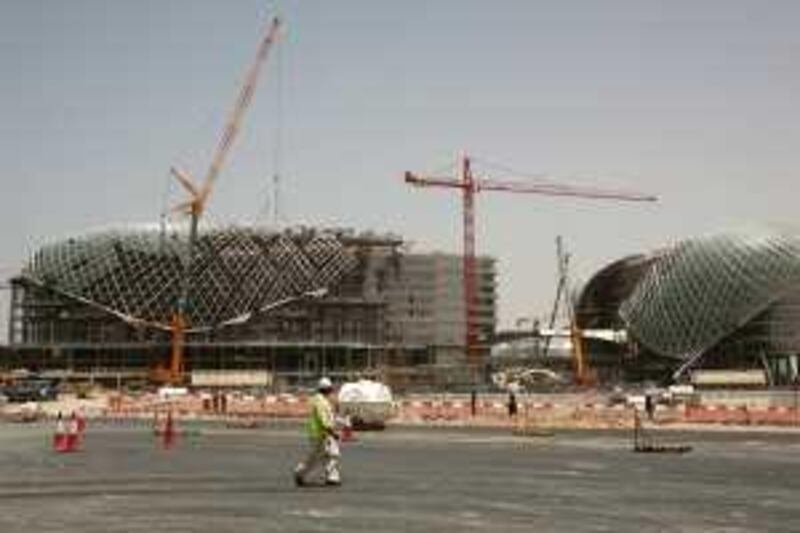ABU DHABI // When 20 Formula One cars roll on to Yas Island for the first Abu Dhabi Grand Prix in November, one of the most complex pieces of technology on the island will be completely invisible. Below ground, under all the hotels and the Yas Marina circuit where 50,000 F1 fans are expected to attend each of the three race days, is a 5.3km system of pipes, which will suck rubbish to a processing point on the outskirts of the development.
Once disposed of at the inlets, the waste will be drawn by vacuum to the processing area - a maximum journey of 2.9km. It will then be taken by lorry to landfill sites, although the technology has features to minimise the quantity disposed of that way. At each inlet there is one chute for organic matter and one for waste that can be recycled, such as paper, tins, glass and plastic. Initially the system will cater for phase one of the Yas Island development, with 35 inlets handling up to 25 tonnes of waste a day, including an average of nine tonnes from the racetrack and its adjacent facilities.
Phase one includes the circuit, the Yas Hotel, the Royal Yacht Club and six other hotels. Next year it will grow, as the Ferrari World theme park and the island's main shopping mall come to life, generating an additional 50 tonnes of waste every day. "The system is being tested and commissioned as we speak," said Michael Merriman, the general manager of Envac Abu Dhabi, the company implementing the project on behalf of Aldar, the developer. "This is a showpiece for Abu Dhabi; it will tell the world Abu Dhabi is serious about the environment."
Stephen Worrel, Aldar's director of mixed-use developments, said the company had chosen this system for its "environmental qualities, future sustainability and operational efficiencies". He added that the island would have a recycling programme to complement the system. Envac's concept has been around since the 1960s and is used in 700 places worldwide, including such cities such as Barcelona and Hong Kong, according to Mr Merriman.
Similar systems are also in use at the Dubai International Airport and at the Jumeirah Beach Residence, where the waste from all 40 towers is gathered at a single collection point via six kilometres of piping. Mr Merriman, who declined to be drawn on the cost, said that the rubbish would accumulate in a container until it was full, triggering the vacuum motors, and then blow through the pipes at 70kph to the central collection point.
Although it needs electricity to generate the vacuum-cleaner effect, Mr Merriman said the new system used 60 per cent less energy than using lorries alone. "The vacuum system works on demand. It is only activated when required and you can empty one chute or all 35." With the exception of a few outlets at the marina, Yas Island visitors will not interact directly with the system, as most inlets have been positioned in back-of-house areas within hotels and leisure facilities, where staff have been taught how to use them.
"We went through a training programme for the users and everyone knows how the system works," said Mr Merriman. However, the company is working on several other projects, some of which have bins in public areas that are linked to an underground collection system. Mr Merriman said other developers had expressed an interest. "We are working on at least six new systems." On average, each UAE resident is responsible for producing 1.75kg of household waste every day, more than in most European countries.
Germans, for example, produce a daily average of 1.6kg of waste. However, through recycling schemes and projects that convert solid waste to energy, Germany manages to reduce the amount of waste going to landfill by 40 per cent. Last month, the Centre of Waste Management-Abu Dhabi unveiled an underground waste collection system to serve densely populated areas. The system, which relies on German technology, is different from the one used on Yas Island as it still relies on rubbish lorries. It stores waste in underground containers of 20 cubic metres. The centre is hoping that the large storage area as well as the compaction of waste will reduce the number of collection trips from three a day to one every two days.
Altogether, 15 of the new bins will be installed as part of the project's Dh14 million (US$3.8m) pilot phase. vtodorova@thenational.ae





